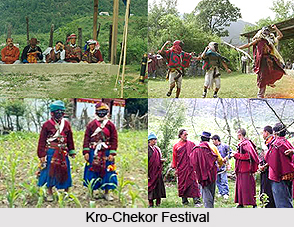 Kro-Chekor festival is one of the important festivals of the Sherdukpen tribe of the West Kameng district, Arunachal Pradesh. Sherdukpens celebrate Kro-Chekor festival with great splendour and high spirits. It is generally celebrated in between the months of May-June as per the lunar calendar. This festival is celebrated for good harvest and overall development of the society. This rite is organised by the whole village community of the Sherdukpen tribe with the aim of providing supernatural protection to the crops sown, for good harvest and to drive away evil spirits, which may cause harm to the village community.
Kro-Chekor festival is one of the important festivals of the Sherdukpen tribe of the West Kameng district, Arunachal Pradesh. Sherdukpens celebrate Kro-Chekor festival with great splendour and high spirits. It is generally celebrated in between the months of May-June as per the lunar calendar. This festival is celebrated for good harvest and overall development of the society. This rite is organised by the whole village community of the Sherdukpen tribe with the aim of providing supernatural protection to the crops sown, for good harvest and to drive away evil spirits, which may cause harm to the village community.
The celebration of Kro-Chekor festival starts a month ahead by reciting holy scripts of Buddhist scared texts. The recitation programme starts at least 15 days ahead of the main festive day, which falls on full moon day in the same month. Every year the village council call upon the village elders as well as the head monk of the village and discuss which holy text they will be reciting and on consensus of the villagers and monk the selected text is recited. During this holy month all forms of hunting and fishing are stopped, if any one is found hunting and fishing then they are fined according to the village council laws. Every villager follows this act very sincerely. The village council nominates `Kachung` (village council worker) from four families from every clan to carry out village council work. These are the people who cook food and carry out every aspect of work for smooth functioning of the festival till there turn ends. The monks stay in Gompas till the end of the recitation programme and the beginning of the main event of Kro-Chekor.
On this auspicious occasion of the Sherdukpens, the villagers contribute whatever is required to carry out the recitation programme as fixed by the village council. This particular aspect of unity among the people makes the Kro-Chekor a great festival. The youths play a big role during the celebration of the Kro-Chekor festival. Each and every clan has its own Blang (house) where youths of every age stay together and celebrate the festival. The eldest youth who takes the responsibility of organizing the Blang is called `Blang-poo Jonno` and the eldest girl is called `Blang-poo Jomji.` They stay away from their homes for more than a month carrying out the works of the Blang preparing Phak (that means local wine), which is the main entity of the celebration. On the main day of the celebration of Kro-Chekor festival, the religious text is carried in procession, which is guarded by masked people carrying flags and monks with drums and blowing instruments. The dances symbolize defeat of evils. People belonging to the Sherdukpen tribe observe the Kro-Chekor festival with immense joy and dedication for obtaining the blessings of the Almighty for wealth and prosperity.



















